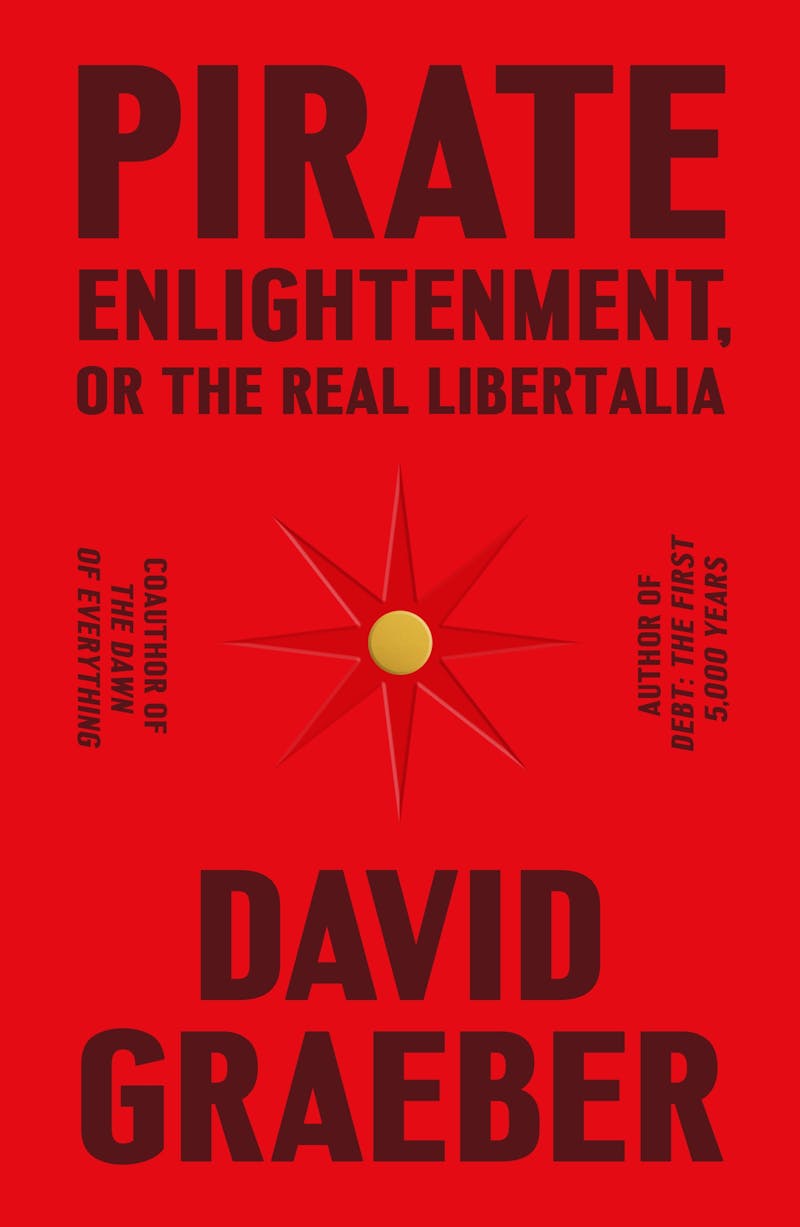Fencing booty is the most underappreciated problem of historical pirate logistics. Myths and stories about “going on the account” (as high-seas piracy was known during its late–seventeenth- and early–eighteenth-century golden age) have always played up the dramas of plunder and pursuit, the terror struck into the hearts of merchant sailors upon sighting black flags on the horizon, the unwashed roughneck crews and their ruthless captains. They are tales of swashbuckling, not bookkeeping. But what was a pirate boss to do, upon seizing a Spanish galleon and filling his ship’s hold to the brim with jewels and silks and gold doubloons? Liquidity was a challenge for pirates, too, since massive hauls of precious goods were not so easily converted into cash. Unless they were fortunate enough to know a corrupt colonial official willing to look the other way, they relied on buccaneer outposts beyond the reach of imperial states where ships could be resupplied, crew members could come and go, and rare treasures could be laundered—no questions asked.
Madagascar was such a place. Around the year 1700, it became an essential waypoint for pirates leaving the Caribbean to prey on the booming shipping lanes of the Indian Ocean. In the secluded harbors of its northeastern coast, pirates founded towns like Ambonavola and Sainte-Marie. With as many as a thousand temporary residents at any given moment, and no permanent government, these settlements were part of an informal archipelago of pirate infrastructure that stretched from the West Indies to East Asia. According to David Graeber’s puckish, posthumous book, Pirate Enlightenment, they were also hothouses of political imagination and freedom. Encounters among pirates and local Malagasy people were good for business, but they also led to radical forms of democratic rule and “the first stirrings of Enlightenment political thought,” so many leagues from Paris or Königsberg. These claims are vintage Graeber: exciting if true, probably right in spirit even if they run further than the evidence allows, deliberately irritating to specialists, and characterized by an anarchist’s delight in the world-making power of ordinary people.

Graeber, who died in 2020 at the age of 59, was an anthropologist and social theorist of the highest caliber. He was also a fierce anti-globalization activist who found in the Occupy movement a cause that suited his distaste for inequality and authority. Pirate Enlightenment is fired by the same rebellious temper. With arresting certainty, it claims that a bold democratic experiment flowered in eighteenth-century Madagascar, thus unraveling tales many times told about how Europeans reinvented democracy and built the modern world first, best, and by themselves.
But this exact provocation—and whether one is convinced by it—is not the main attraction of the book, and has little to do with the reasons we’re likely to revisit Pirate Enlightenment in years to come, or the nature of its lasting treasure. It will linger because it shines so splendidly with what mattered most to Graeber, and why he mattered to us: an uncommon intellectual style that was mischievous and generous and wildly ambitious yet always so inviting, a spirit he applied to many-thousand–year historical anthropologies of debt and inequality, the rise of “bullshit jobs,” and the shadow allure of bureaucracy. (His last great instigation was the modestly titled The Dawn of Everything: A New History of Humanity.) Even more, the book clarifies Graeber’s historical vision, his view of why the past matters and how people should write about it. Pirate Enlightenment is his best effort to show us how we might use history not for knowledge or even justice, but for freedom.
Barnaby Slush was a Royal Navy cook who served aboard HMS Lyme around the turn of the eighteenth century. He explained in 1709, no doubt thrilling and disturbing English readers, that “Pyrates and Buccaneers” were “Princes” to other sailors—because they treated one another as democratic equals. “Great robbers as they are to all besides,” Slush said, pirates “are precisely just among themselves.” Even a heartless captain, “bold as he is in all other Attempts … dares not offer to infringe the common laws of Equity” upheld by his crew.
At least since the infamous dread pirate Captain Flint haunted the pages of Robert Louis Stevenson’s Treasure Island, pirate vessels have been treated in the popular imagination as floating dictatorships. But this is more propaganda than truth. It was on board imperial navy ships, in fact, that discipline was arbitrarily brutal and officers behaved like tyrants with their working-class subordinates. Many pirates were ex-sailors. Having risked their lives and souls by mutinying against this kind of despotism, they were loath to re-create it. Their death warrants written, freedom was the highest prize in the time that remained.
Pirates were deliberately “masterless men,” the historian Marcus Rediker has argued, and ruled themselves accordingly. Captains could issue orders in the heat of battle or during a chase, but otherwise their power was limited. Elected by majority vote, they could also be removed. Captains participated in crew assemblies and ship councils on the same footing as everyone else. And they shared power with a quartermaster who distributed resources, resolved disputes, and represented the crew. For one eighteenth-century observer, this role was an “Imitation of the Roman Tribune of the People.” Another saw the quartermaster as the ship’s prime minister. Beyond captain and quartermaster, pirates were rankless. The 1724 classic A General History of the Pyrates, possibly written by Daniel Defoe, detailed that pirates permit a man “to be Captain, on Condition, that they may be Captain over him.” This was democratic sovereignty distilled, like sugarcane into rum.
It was in the 1690s, Graeber suggests, that this “rough-and-ready egalitarianism” made its way ashore in Madagascar. Pirates established semipermanent outposts and brought with them the same collectivistic ethos they practiced at sea. The founding fathers were just as underworldly as one expects. Adam Baldridge, an ex-pirate wanted for murder in Jamaica, established Sainte-Marie: a buccaneer village that appears to have flourished anarchically until Baldridge (in hock to a sleazy New York merchant) sought to enslave his Malagasy allies, and local chiefs destroyed the settlement in retaliation. Afterward, it was the town of Ambonavola, resurrected on pirate foundations by the Bermudan ex–Royal Navy sailor Nathaniel North, that became Madagascar’s top raider outpost. In Graeber’s account, the pirates prospered for three reasons: They had the world’s most luxurious goods to trade, they weren’t interested in territorial conquest or colonization, and they happily integrated their lives with those of local women and men, having cut themselves entirely loose from their homelands by going on the account.
Word of these Madagascar pirate realms traveled, their existence transmuted into myths. In the early 1700s, rumors began circulating in Europe that the world’s most abominable pirate, Henry Avery, was building a full-blown pirate kingdom in the Indian Ocean with his wife, the kidnapped daughter of the Mughal emperor Aurangzeb. Mysterious envoys even began arriving at European courts, allegedly representing this powerful nonexistent state and its tens of thousands of pirates. (Sweden signed treaties and readied an embassy before realizing that it was a scam.) Even more resonant was the legend of Libertalia, an egalitarian paradise where working pirates lived free lives without slavery or coercion or even property. There’s no evidence either of these political entities ever literally existed. But something at least as interesting did.
Enter the Betsimisaraka Confederation, a sprawling, amorphous Malagasy political entity that controlled about 700 kilometers of coastline and was brought into being in the 1710s. Its founding king was Ratsimilaho, thought at the time to have been the son of an English pirate and a Malagasy mother. Western historians of the region have apparently long seen the confederation as a weak state and failed kingdom, while archaeologists have come up empty in their search for physical evidence of centralized authority. Graeber suggests that this is a deep misreading of what was actually an alternate kind of state, one that relied on a figurehead monarch to mask a radically decentralized and even democratic social order. Although the evidentiary record is sparse and contradictory, Graeber wants readers to see the confederation as an imaginative “proto-Enlightenment political experiment” that was able to combine pirate democracy with local traditions of egalitarianism and debate.
At the heart of Malagasy decision-making in the age of the Betsimisaraka Confederation were kabary, deliberative assemblies in which men and women sought consensus around issues that affected entire communities. Kabary appear to have been held within villages, among clans, and even regionally. Considered alongside more informal local preferences for vigorous discussion, the kabary suggest to Graeber that Malagasy society was marked by the same kind of freewheeling horizontal sociability so often claimed by Europeans as the fuel of their own Enlightenment. When these Malagasy traditions collided with pirate egalitarianism, shared through conversation and commercial exchange, the confederation was born. In Graeber’s telling, it was nothing less than a radical experiment in making “a decentralized grassroots democracy without any developed system of social rank,” a great accomplishment that outstripped anything achieved by European rulers or philosophes.
Narrating democracy’s modern history through the contributions of regular people around the world, rather than the writing of Western intellectual elites, was an intellectual project that Graeber pursued throughout his career. “Rather than seeing Indian, or Malagasy, or Tswana, or Maya claims to being part of an inherently democratic tradition as an attempt to ape the West,” he argued in 2007, “it seems to me we are looking at different aspects of the same planetary process.” What had really occurred in the modern period, Graeber thought, was not a game of colonial catch-up to Western progress but “a crystallization of longstanding democratic practices in the formation of a global system,” with democratic ideas “flying back and forth in all directions.” The same intuition motivated Graeber not to reject the Enlightenment as intrinsically flawed and violent and anti-human (a critique leveled by many of his compatriots on the left), but instead to redeem it: to show that its most liberatory ideas were actually invented not by male European elites trying to secure power and cover their tracks, but by the people shoved to the margins.
One can be sympathetic to Graeber’s overarching agenda, even agree that the voices and actions of Malagasy chiefs and working-class pirates in particular should be more central to the stories we tell about democracy’s ascent, and still find Pirate Enlightenment, alas, unconvincing as a work of history. It’s extremely plausible that the Malagasy practiced a kind of deliberative democracy, and that they discussed ways of ruling themselves freely with sojourning pirates. But Graeber is unable to say much about how the kabary system actually worked in practice within the Betsimisaraka Confederation, how decisions were made and how power functioned, whether conversations with pirates ever really occurred, and, if so, what they were about. The evidentiary record is just too weak, which Graeber himself acknowledges. The most essential source was written decades after the events in question by a French spy, whose primary goal was generating more intrepid fake exploits for a fraudulent Hungarian count.
The result is a set of credible conjectures, smelted into facts and forced to bear the weight of a rather bold argument, which they simply cannot. We are told that it “would hardly be surprising” if the young Malagasy men building the confederation took the pirates as role models, as “some degree of political synthesis” is precisely “what one would expect.” He concedes that “one has to imagine” how kabary were used in this political experiment, as sources offer scant detail. And the conversations said to have conjured an Enlightenment-style sociability among pirates and Malagasy locals “have, of course, been almost entirely lost…. We can only know they must have taken place.” This is a captivating story, if true. Yet, as Graeber notes, “there is absolutely no way” to “establish a definitive narrative” of what occurred. “All we have … are a series of tiny windows on extraordinary events.” By the end of Pirate Enlightenment, it’s hard not to feel that Graeber has painted himself into an unnecessary corner, trying to defend his account of the confederation’s radical politics with silent sources, expending too much effort to nail down irrelevant details like whether Ratsimilaho needed permission to live in his father’s house.
It’s surprising, because Graeber knows that historical inquiry isn’t synonymous with this kind of cramped empiricism. Throughout the book, Graeber teases a revealing critique of historians’ literal-mindedness. He is irritated by scholars who focus on the “rather trivial” question of whether Libertalia actually existed as the myths had it. What’s far more interesting and valuable, he says, echoing a generation of cultural historians, is how these appealing fantasies rippled through the world, altering people’s feelings of what might be politically possible. He is right to argue that narratives and rumors can be forces that alter the course of history. The status of the underlying facts can, in some cases, be immaterial. There may be much we don’t know about pirate democracy and Malagasy enlightenment, Graeber concedes, but our “ignorance is only of the specifics.”
For all the thunder and lightning of Pirate Enlightenment’s many historical provocations, it’s this line, delivered casually and without further comment, that might be most radical. What does it mean, Graeber appears to be challenging us, to write a kind of history that’s built upon general truths and trends and likelihoods, but indifferent to the specific details of what happened? Less generous readers might protest that this describes social theory, or even poetry or philosophy, not history, and that Graeber has committed the error here of confusing one for the other. Or that pronouncing “the specifics” irrelevant is merely a convenient way for him to make claims he would like to be true, despite a lack of proof. But Graeber deserves more credit than this. What courses through Pirate Enlightenment, tragically unfulfilled, is an idiosyncratic yet compelling vision of historical style and the value of worlds past.
History can be written in multiple keys and for different purposes, often overlapping, all of them valuable. At a time when the historical profession faces an existential decline, the dominant public registers include the genealogical explanation of contemporary ills (from violent white supremacy to unbound international capitalism), historical analogy, and the pursuit of justice through the rescue and amplification of marginalized voices and groups. Anarchist to his bones, Graeber felt that historical inquiry should first and foremost serve freedom, deepening our capacity to imagine and pursue it. This shift in emphasis is subtle but powerful. It reflects a scholarly intention with which we’ve grown unfamiliar.
Throughout Pirate Enlightenment, Graeber makes a point of explaining what has gone so parlously wrong with historical writing, and how it might be done better. He laments that “existing history is not just deeply flawed and Eurocentric” but also “unnecessarily tedious and boring.” This aesthetic argument echoes what he and David Wengrow claimed in The Dawn of Everything, that much writing about the past tends to “dry everything up, reduce people to cardboard stereotypes,” or “simplify the issues” in ways that often “undermine, possibly even destroy, our sense of human possibility.” Graeber had also tired of moralistic histories that aimed to prove “how much one is not letting the Great Men of history off the hook.” This kind of theatrical judgment was a “surreptitious pleasure,” he believed, “tawdry” and fleeting.
In place of all this, Graeber wanted to see more historical writing that approached the past primarily as a mind-expanding “encyclopedia of social possibilities,” a vast reservoir of alternate worlds and radical experiments in freedom. This would have to be a project that focused not on the “dead zones” and constraining forces of modern life (Graeber’s turf in previous books) but rather on the vibrant “margins of the emerging world-system,” where people were able to live differently. Like the great leftist social and cultural historians of the 1960s and 1970s—scholars of workers and artisans and peasants like E.P. Thompson and Natalie Zemon Davis, who believed in writing “history from below”—Graeber knew that human freedom and creativity have always flourished most among the nooks and the crannies of established systems, thriving in power’s indifference and neglect.
“We are projects of collective self-creation,” he observes with Wengrow in The Dawn of Everything. “What if we approached human history that way?” What if we treated people who lived many years ago “as imaginative, intelligent, playful creatures who deserve to be understood as such?” The result might look like Pirate Enlightenment, a book sewn together by Graeber’s determination to share with readers the delight and excitement and awe he feels when paying attention to the lives and imaginations of ordinary people. “Let us tell, then, a story,” Graeber begins, gleefully setting the stage, “about magic, lies, sea battles, purloined princesses, slave revolts, manhunts, make-believe kingdoms and fraudulent ambassadors, spies, jewel thieves, poisoners, devil worship, and sexual obsession that lies at the origins of modern freedom.”
Graeber wrote about pirates and Malagasy chiefs not simply to rescue them, or to right a wrong, or to be accurate—but to take heart in what they may well have accomplished, to revel in their creative antics and vital spirits, and to help us all be a little bit freer. This is the real treasure of Pirate Enlightenment, its intellectual bequest. Graeber found strength and world-changing power in a historical mode that reflected the human lives at its vital center: disordered and astonishing and messy and feral and always, always, fun.






